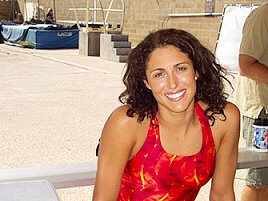Exclusive: Changing Swimming Nationalities: Part III. To Switch, or Not to Switch?

By Phillip Whitten
In Part I of this series of articles, we noted that increasingly, world-class athletes – including swimmers – are changing their sports nationalities. Reasons vary from the purely personal to a desire for fame and fortune. Part II explored the notion of “free agency” for Olympic-level athletes. In Part III, we’ll look at the issue of sports nationality from the athlete’s point of view.
To switch sports nationality or not to switch sports nationality?
For an increasing number of world-class athletes, that, indeed, is the question. And it’s a question that is being answered in a variety of ways.
Some athletes, due simply to the circumstances of their birth or to the idiosyncratic laws of specific countries, have dual citizenship. In recent years, Americans Ron Karnaugh, Mike Cavic and Gabrielle Rose — Olympians all – fell into the dual citizenship category.
Karnaugh, a1992 US Olympian, has dual US and Polish citizenship. Thirteen years ago in Barcelona, he arguably was the fastest 200 IMer in the world and was favored to win a medal, most likely gold. Tragically, his father collapsed and died right after the US team marched into the Olympic stadium during Opening Ceremonies. Devastated, Karnaugh elected to swim his event. Understandably, his mind and heart were elsewhere, and he finished fifth.
In ’96, he just missed making the US team. At the US Trials four years later, he led for the first 150 meters before fading on the final 50. By ’04, a 38 year-old Karnaugh, now a medical resident, knew his time was passed but wanted one more shot at the Big O’s. So he invoked his dual citizenship and opted to swim for Poland.
Gabrielle Rose reversed that scenario. Rose’s mom is Brazilian and her dad American, so she holds dual citizenship. In 1996, she represented Brazil at the Atlanta Games. She continued improving and could easily have made the Brazilian team in 2000. Instead — citing the fact that she was raised in Memphis, Tenn., where she began her career, and that she honed her skills at Stanford, where she was a 22-time All American — she chose to try and make the US team. A long shot, she succeeded, and represented the USA with class in Sydney.
Another swimmer faced with the dual citizenship dilemma was Milorad Cavic. Raised in California, honored as Swimming World’s High School Swimmer of the Year” four years ago, and presently a student at Cal, Cavic — known as “Mike” — is a 100-meter butterfly specialist. He even briefly held the short course world record in the event before Ian Crocker put it out of reach by mere humans. Though good enough to final at the Olympic Games, his chance of nudging either Crocker or Michael Phelps aside at the US Trials were remote at best. So he decided to swim for Yugoslavia, the country he has represented in numerous international meets.
Cavic’s dilemma could be a textbook example of why a swimmer – even one without dual citizenship – might decide to change sports nationality, be it to another major swimming nation or to a wannabe swimming nation with cash, such as Qatar.
Let’s say you are ranked third, fourth or even tenth in the world, but two of the swimmers ahead of you are both Americans — or, if you’re an Aussie, both other Aussies. Think Krayzelburg and Peirsol in the100 and 200 back in 2000, Crocker and Phelps in the100 fly, Henry and Lenton in the 100 free or Thorpe and Hackett in the 400 free.
Why gamble 10 or15 years of hard work on a long shot? Especially, when you can swim for, say, Qatar, and be assured of an Olympic berth – not to mention some mean green. Not only that, but by skipping a Trials meet, you won’t have to try to peak twice, a tricky business. So, you’re likely to come to the Games better off than if you’d swum a Trials.
In fact, you’re better off in most ways: Instead of sitting home and watching on T.V., you’ve made the Olympics. You have a good shot at winning a medal. You only need to peak once. And you’re being paid Big Bucks.
Logically, especially for some athletes, switching nationality makes sense.
On the other hand, there are such values as patriotism and loyalty – determining factors for the vast majority of Olympic hopefuls.
One Olympian who chose patriotism and loyalty over money and public adoration was Russia’s Alex Popov.
Popov lived in swim-crazy Australia for years, where he trained under Gennadi Touretski and where he was revered by the public. Had he changed his national allegiance to his adopted home, he stood to win additional Olympic medals on the Aussie relays (Popov, Thorpe and Klim for three of the four legs) and to make millions of dollars.
After he was stabbed by a watermelon vendor in Moscow in l996, he even had a demonstrably good reason to bid farewell to Mother Russia. But he never wavered, remaining loyal to the country that had birthed and nurtured him.



